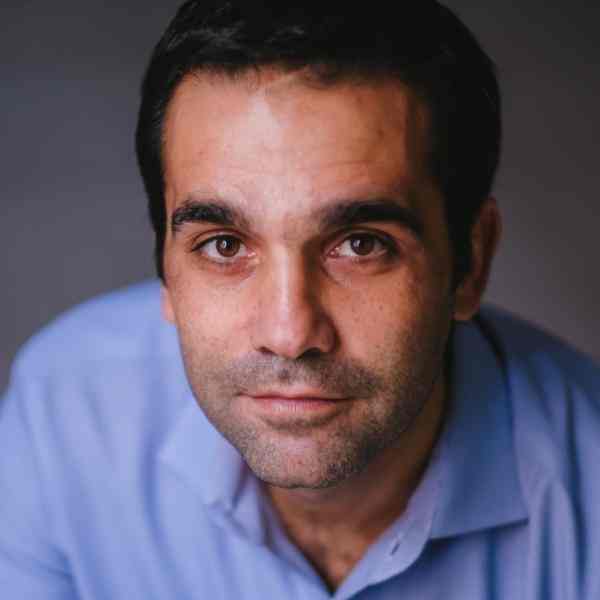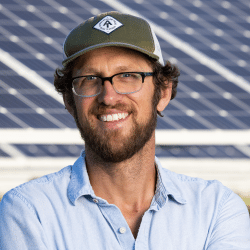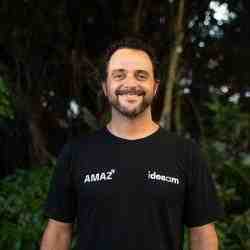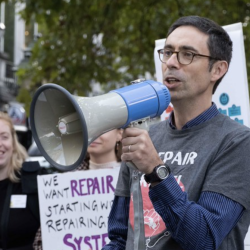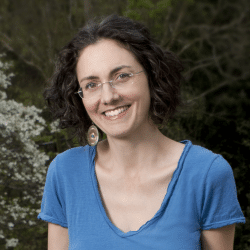Introduction
Through Reciclarg, Farid is promoting an electronic waste recycling sector in Argentina. To do so, he is fostering the development of adequate infrastructure, business practices reinforced on circular economy principles and the adoption of a new social conscience to reduces the environmental impact of technology.
The New Idea
In a country where recycling is not a common practice and currently recycling players only focus on a few profitable parts, Farid has patiently and systematically developed a holistic system that allows for the treatment of waste and electronic equipment (WEEE). At present, he has developed a destination for approximately 90% of all discarded WEEE, collecting is all at Reciclarg, the organization founded by Farid. In addition to the collection of WEEE, Farid is also creatively recycling the pieces to create new products and uses.
Farid is working out a new frame for the recycling of electronic waste by creating norms and licenses in a very informal and underdeveloped Argentina market. Establishing the concept as a first, his holistic approach focuses on preserving environment over earnings. The WEEE disposal solutions designed by Reciclarg includes the development of local and international alliances for the sale of inputs and the creation of supre recycling (upcycling) products such as games, accessories and gifts, which give new life to waste. Farid envisions a sector that among solving environmental challenges could be a source of economic development and life quality improvement by employing young people without a degree and including women from the informal sector, enhancing their skills and the company' social contribution.<br> <br>
Almost everyone has an old computer or phone at home. To reach greater social awareness, Reciclarg carries out trainings and campaigns in communities, companies and schools, teaching principles of circular economy in a practical way and promoting an active role for citizens to fulfill the purpose of decontaminating the country of electronic garbage. While Reciclarg began its operations in the province of Mendoza, it has already managed to expand to other provinces in Argentina and has been spotted by various international awards and organizations as an innovative model.
The Problem
In Argentina, the recycling industry, and in particular recycling of Electronic and Electrical Appliances and waste (hereinafter, "WEEE"), is not very developed and the few entrepreneurs who carry out initiatives in this area are mainly focused on the processing of waste that is profitable in the local or international market, the former being poorly developed. In Argentina, there are no regulations that encourage social awareness or business practices of electronic recycling and state policies on the matter, are almost nonexistent.
The growing technological development around the world generates the subsequent exponential increase in WEEE. According to a study by the United Nations University (UNU), there were 44.7 million tons of WEEE in the world in 2016, a figure that increased to 46 million tons the following year, and the projection for 2018 is more than 49 million tons. Argentina, specifically, produces 300,000 tons of electronic trash per year, which represents 7 kg per capita— the third worst figure in the region—after Brazil and Mexico.
<br>WEEE is toxic. Some of the dangerous substances contained in electronic equipment are arsenic, cadmium, phosphorus, selenium and lead. If these wastes are sent to garbage landfills or are not handled correctly when they are dismantled, the toxic components are released, with serious consequences for the people who handle them and the environment; affects include groundwater contamination and reduced air quality when burned. Many people, including children, extract the valuable components of WEEE without any protection.
Approximately 50% of the 300,000 tons of WEEE per year in Argentina is found in homes, offices, public offices and warehouses; 40% is buried or discarded in landfills; and the remaining 10% is incorporated into both formal and informal waste management processes. This represents a waste of resources that could be exploited, as well as being a threatening source of contamination. The few existing players dedicated to this type of recycling deal exclusively with the components, such as platelets, that are well-paid by the international market due to the minerals they contain, and are not interested in the environmental and health aspects of the problem. The informal recyclers are typically also focusing on a few parts.
Among the most used electronic devices on a daily basis, cell phones and computers, have the highest recycling rate. More than 90% of its parts can be recycled and reused, as they are easy to disassemble. It is estimated that at least 14% of discarded WEEE could be reused without significant intervention or repairmen. Not taking advantage of them represents a waste of raw materials and undermines the reduction of the digital divide.
There is a lack of legislative and cultural incentives that value recycling which is preventing people from changing their habits. Based on the 2006 Mercosur Decision Project for the Creation of Common Bases for the Management of Special Waste, Argentina agreed to create adequate conditions to finance the practical implementation of the "extended producer responsibility" (REP). The REP laws require that producers be responsible for their products once their customers discard them, but this law is not yet fully implemented and regulated. For the rest, there are still no initiatives by producers or importers to implement the regulation, and there are no state incentives to enforce it. Some NGOs worked together with the government on this, and a law to provide budgets for the Management of WEEE was drafted, but there has been no progress on this. The main barrier to the development of the recycling of electronic waste is the lack of awareness, not only by the citizens but also by the public and private sectors.
The Strategy
Reciclarg is based on the circular economy paradigm. Its ultimate objective is to achieve a "zero waste" process and to create a market and incentives around it.
Being moved by the size of the problem and the complete absence of sustainable and comprehensive solutions in the country, Farid begun his journey in the field by doing research. During this first learning phase in the sector, he focused on the process of disassembling computers and other devices catered towards best practices of waste handling and safe processes. After doing so, he contacted cooperatives, chacaritas (kind of waste storage lands) and urban collectors to develop a comprehensive model.
To access WEEE, Farid through Reciclarg and in agreement with the municipalities, assembled seven “clean points” in strategic locations around the city of Buenos Aires to receive electronic waste directly from citizens. To help citizen and corporate participation Reciclarg organizes campaigns to raise awareness of the problem and increase recycling habits through workshops and fairs. To date, they have held 89 fairs.
Through Reciclarg, Farid developed a value chain for electronic waste connected to the different product lines: beautiful accessories, handcrafts, business gifts and pieces for replacement to give a second life to technology equipment. The main purpose of Reciclarg is to decontaminate the region of electronic waste. When they do not have an adequate destination for one of the components Reciclarg has a policy of storing it until the find a sustainable destination.
Some components are introduced into a supra recycling unit, where Reciclarg designs products with expert's. Products such as educational games for children and the elderly that, among educating them, serves to further raise public awareness. In 2017, they completed for the first time a full circuit for the disposal of materials when they achieved the first export of platelets, to a company in Belgium. This first export has become a milestone for Reciclarg to develop a financial sustainability model and the opportunity to position the organization in the international scene. To reach up to this point, Farid went through a very challenging year path that included the curation of a buyer’s network and getting governmental authorizations in a very bureaucratic system.
In order to build viability to his approach and to introduce new players in the field, together with a group of parliament members, Farid actively worked on a bill that is subject to evaluation in the Environment Commission of Mendoza. If approved, this regulation will allow regulating and fining companies that dispose of their waste in an unsustainable manner and guide the community towards the proper management of WEEE. Despite the law not yet being in regulation, Farid has already established a growing group of companies that are working with Reciclarg, training their employees and managing their WEEE such as IMPSA, Cuyo District, Los Andes Newspaper, Farmacias del Centro, among others.
Public awareness and creating a cultural shift for recycling of WEEE are key. In this regard, Reciclarg has created workshops and courses for schools and companies, lobby and advise legislators and public officials on the importance of recycling and also provide training to waste pickers cooperatives on how to treat varying types of waste. In schools' children are trained in a didactic and playful way about the negative consequences of WEEE mismanagement and also engaged around the importance of their individual participation in the creation of a zero waste society. In companies, Reciclarg provides assessments and trains staff on to manage waste; furthermore helping to build partnerships with those companies so that Reciclarg can be the destination of their recycled WEEE. Working with companies is a real challenge due to the lack of cultural and legislative incentives that still persist. However, Farid has already achieved the first steps in a cultural change with some companies paying for the collection of WEEE; this is a contrast to what happened a few years ago when they had to offer it as a free service.
Farid believes that WEEE management can be an engine for socioeconomic renewal, generating new sources of employment, and above all, empowering vulnerable groups. In 2018, Farid started an alliance with the Ministry of Social Development through which Reciclarg is training women from vulnerable sectors in the production of jewelry and games from recycled materials. In doing so, he in enabling the women to gain new skills and extra income through fair payment while developing jewelry for Reciclarg. They also partnered with the Ministry of Labor on an inclusion program for young people who do not study or work. Through the program they provide skills training while also getting youth to recommit to finishing their studies. They already employ 5 young people and another 3 will be joining Reciclarg in the next month. In the coming months Farid will start working with cooperatives to integrate them to his comprehensive approach as he has already established the different aspects of his viable and sustainable solution.
With national and international certifications to operate in the province of Mendoza and nationally, Reciclarg is positioned as a key driver of WEEE management with a unique and holistic approach. Reinforcing this, they received several national and international awards among which stand out: the recognition of the Legislature of Mendoza to companies of Triple Impact (2017), winners of Eikon in the category of Environmental Sustainability (2017), first prize in Environmental Impact (2016), Finalist of the UN Entrepreneurial Award (2016) for Andrea Nallim, sister and partner of Farid.
Reciclarg obtained its certification as B company in 2017. From the beginning it was conceived as a company with a clear social and environmental purpose and Farid invested personal resources and voluntarily worked in the company without receiving a salary to date, but with the firm conviction to make it sustainable in a short term, after having established the foundations to achieve it. The initiative began in Mendoza, but strategic projects have already begun in the provinces of San Juan, La Rioja, Córdoba and San Luis.
In the near future, Reciclarg will start operations in eight provinces and will incorporate new products for recycling—such as batteries and large appliances like refrigerators—while continuing to advance legislation and work with companies to spread his solutions.
The Person
Farid was born in Mendoza, Argentina, in 1980 and grew up in a middle-class family with his 3 sisters. His father, an entrepreneurial medical doctor focusing on active aging founded a geriatric center that is managed by the family.
During high school, Farid spent a year studying in the U.S. where he was exposed to recycling for the first time through a neighbor who was recycling soda cans. Farid was fascinated by the idea of recovering aluminum and using it as raw material to create new products. That idea remained dormant for years as Farid studied business administration and started working for a human resources company but was disappointed by the impersonal way in which people were treated.
After that first experience Farid joined the family business where he played various roles. In 2008, he read an article in the newspaper on the problem of electronic waste and decided to develop a solution to this serious problem. He leveraged the Naves Competition, a competition for entrepreneurs by the prestigious Austral University business school as an opportunity to set up his enterprise in the field of electronic waste recycling, activating his passion to decontaminate the world and take care of environment. He was soon joined by his sister, Andrea, who first backed his application and later became his partner. Farid won the prize and received the support of prominent advisers with whom they developed the initial business plan that was the start of Reciclarg.
To continue strengthen his knowledge of the field, Farid completed a Master degree in Renewable Energy and Environment. He also invested personal resources and kept a job at his family business in order to develop Reciclarg patient model. Today Farid is totally committed to expanding his business to other regions of the country and beyond.
